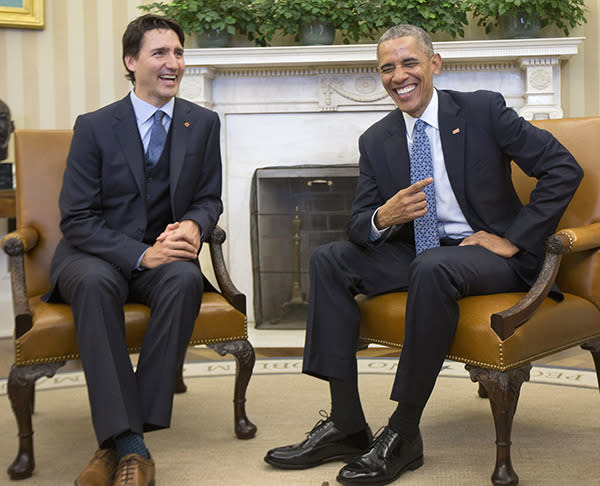Why President Obama’s approval rating is at a 3-year high

President Obama laughs while meeting with Canadian Prime Minister Justin Trudeau in the Oval Office of the White House. (Pablo Martinez Monsivais/AP)
President Obama’s approval rating is the highest it has been since May 2013, according to a new Gallup poll.
In his final year, 50 percent of those surveyed approve of the job he has done so far, higher than his average approval rating of 47 percent since entering the Oval Office in 2009.
It’s difficult to say exactly why Obama’s approval has risen, but a plausible theory is that Americans are frustrated — even horrified — with their options for his successor.
“There’s a sense that the presidential candidates are not palatable to a lot of the public,” Art Swift, managing editor at Gallup, said in an interview with Yahoo Politics. “And I think people are starting to realize they had a pretty good deal with President Obama. They understand him. They know him. I’m sure there’s more fondness for him than people even realize.”
Republican frontrunner Donald Trump’s braggadocio has set an unusual tone for the party’s primary debates. Other candidates, such as Texas Sen. Ted Cruz and Florida Sen. Marco Rubio, joined the brash billionaire in flinging personal insults and schoolyard taunts. For instance, after Trump took to calling Rubio “little Marco” on account of his height, Rubio suggested that Trump has small genitals.
By comparison, to many Americans, Obama’s behavior and temperament come across as far more statesmanlike and befitting the country’s highest office.
On the Democratic side, frontrunner Hillary Clinton is one of the nation’s most polarizing political figures. For many, the Benghazi and email scandals have tarnished her reputation and cast doubt on her credibility. Her competition, Vermont Sen. Bernie Sanders, is a self-proclaimed democratic socialist who wants the country to move toward a more Scandinavian style of governance — alienating many conservative and more moderate voters.
Yet again, by comparison, Obama may come across as less duplicitous or radical in the eyes of many citizens.
Because Obama’s approval rating has been rising during the past year among Democrats, it stands to reason that Clinton is presenting herself as the torchbearer for Obama’s legacy in the primary.
Opinions of Obama are still predictably split along party lines: 87 percent of Democrats approve while only 11 percent of Republicans do. Despite this polarization, overall, Americans view Obama in his final year similarly to how they viewed former President Ronald Reagan in his: 51 percent approved — almost the same.
Economic indicators, Swift said, are another factor in Obama’s approval rating. He noted that unemployment is below 5 percent and “job creation remains robust.” Swift said today’s economy is more like that of former President Bill Clinton’s final year than the last year of Obama’s predecessor, former President George W. Bush.
In March 2008, only 32 percent of the war-weary American public approved of Bush’s job performance. He fared roughly the same as Obama does now with the opposing political party (9 percent), but his support among his own party was 72 percent — that’s fewer than three in four Republicans.
“The economy was definitely in recession at that point. It wasn’t as bad as it would be a year later, but things were definitely on the decline and people were not happy with Bush,” Swift said. “There was a palpable sense that people wanted a change away from him.”
According to the polls, it does not appear that the American public feels the same urgency to change away from Obama.
“This could portend well for Hillary Clinton, who is essentially running on a third-term Obama premise in lots of ways,” Swift added.
The results of this Gallup poll are based on telephone interviews with a sample of 3,563 adults in all 50 U.S. states and the District of Columbia, conducted from Feb. 29 to March 6, 2016.
